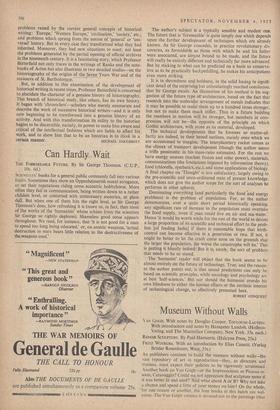Historiography
MAN ON HIS PAST. By Herbert Butterfield. (C.U.P., 22s. 6d.) ACTIVMES emerge. naively, like games that children invent for themselves. Each appears, first, as a direction of interest pursued without premonition of what it will lead to. How should our ancient ancestor have known what (as it has turned out) it is to be an historian? And yet it was he who, in turning his attention to the past, set our feet on the road which has led to what we now recognise as 'historical inquiry.' For, from a direction of interest pursued pertinaciously there has sprung an activity specified by a 'practice'; and a participant has come to be recognised not by his achievements but by his disposition to observe the manners of the 'practice' : an historian is a man who thinks 'historically.'
The long process in which an interest in the past became speci- fied as 'historical inquiry' has, it seems, thrown up two kinds of historian. First, the scholar who, like Maitland, seems to be very little reflective about the activity he is engaged in, but whose historical 'manners' arc so perfect that he can appear as the image of what (for the moment) it is to be an historian And, secondly, the scholar, like Ranke or Acton. who not only engages in the 'practice' as it has come to be, but is aware also of the history of its emergence and of the temporary character of its present condition; in short, the reflective historian who under- stands himself to be engaged in an historical inquiry and at the same time to be determining the nature of historical inquiry.
Professor Butterfield is concerned with the impact of the second of these types upon the study of the past. In this book he travels over a passage in the emergence of current historical 'practice' and reflects upon the utility to the historian of a knowledge of the history of historiography. In an earlier work, The Englishman and his History, he considered some episodes in the earlier history of English historiography; here his theme is the manner in which the activity of being an historian came 'to be understood by the great school of German historians. This is a supremely important chapter in the history of historiography because it concerns the emergence not only of the critical techniques and practices which constitute current historical inquiry, but also the current con- ceptual framework of historical writing.
It has long been recognised that the activity of being an historian suffered a great transformation in the early nineteenth century; and this revolution is usually connected with the names of Niebuhr and Ranke. But, without denying their' pre-eminence, Professor Butterfield is concerned, first, to disclose their antecedents in this matter, whom he finds at work in the University of Gottingen in the decades around 1760. Here is the spring of the intellectual movement which generated modern historical practice. It was among these, often obscure, eighteenth-century historians, who had felt the touch of both rationalism and romanticism, that the current conceptual problems of historical writing first came to the surface.
After, in this manner, pushing the origins of modern historio- graphy back into the eighteenth century, Professor Butterfield turns to consider 'the later development of the activity of being an historian. And this resolves itself, chiefly, into a study of the impact of Ranke and Acton upon historiography. Many of the problems which these two writers reflected upon had already been opened up by their predecessors—the problems of periodisation; problems raised by the current general concepts of historical writing: `Europe,' Western Europe,' civilisation,"society,' etc.; and problems which sprang from the notion of `general' or 'uni- versal' history. But in every case they transformed what they had inherited. Moreover, they had new situations to meet; not least the problems generated by the partial opening of official archives in the nineteenth century. It is a fascinating story, which Professor Butterfield not only traces in the writings of Ranke and the note- books of Acton but also illustrates in two detailed studies—on the historiography of the origins of the Seven Years War and of the massacre of St. Bartholomew.
But, in addition to this examination of the development of historical writing in recent times, Professor Butterfield is concerned to ,elucidate the character of a genuine history of historiography. This branch of historical study, like others, has its own history. t began with `chroniclers'—scholars who merely enumerate and describe the work of successive historical writers—and it is only now beginning to be transformed into a genuine history of an activity. And with this transformation its utility to the historian begins to be discernible, namely, its power to make him aware and critical of the intellectual fashions which are liable to affect his work, and to show him that to be an historian is to think in a











































 Previous page
Previous page